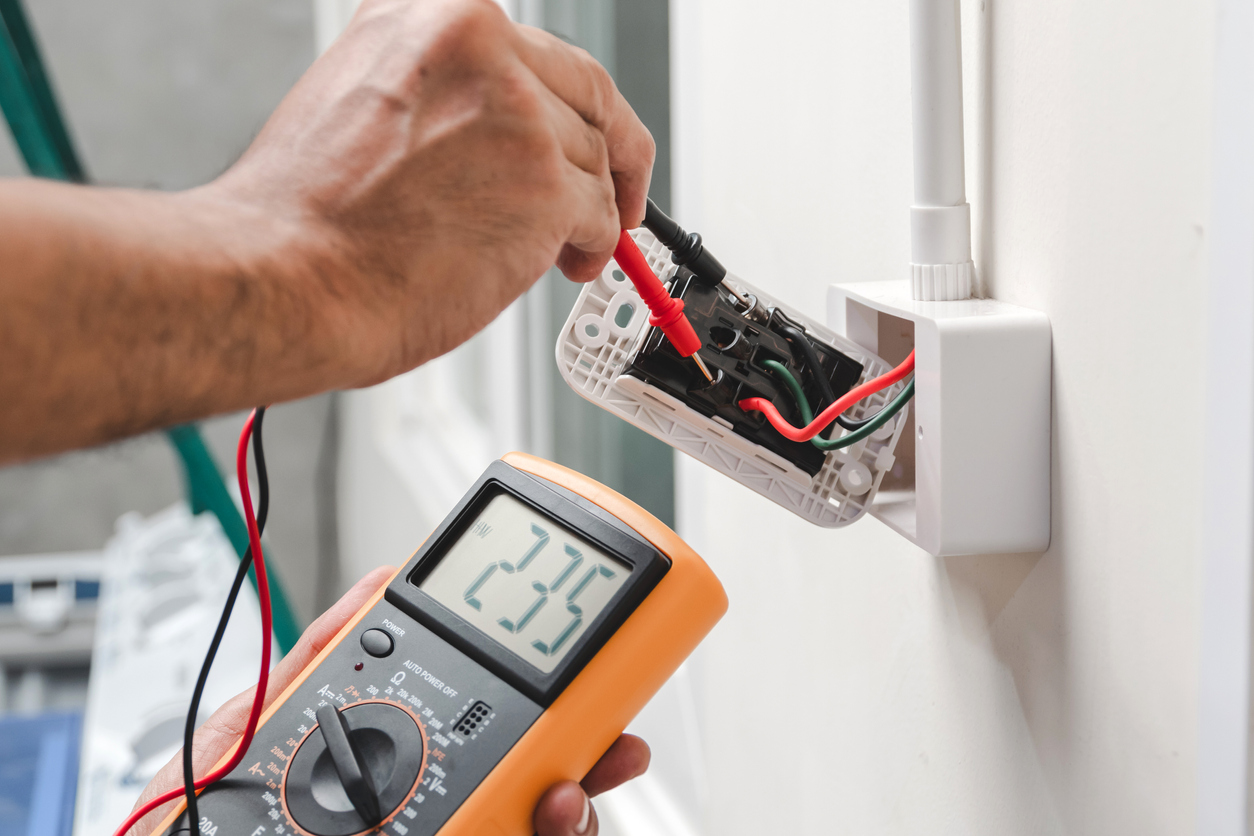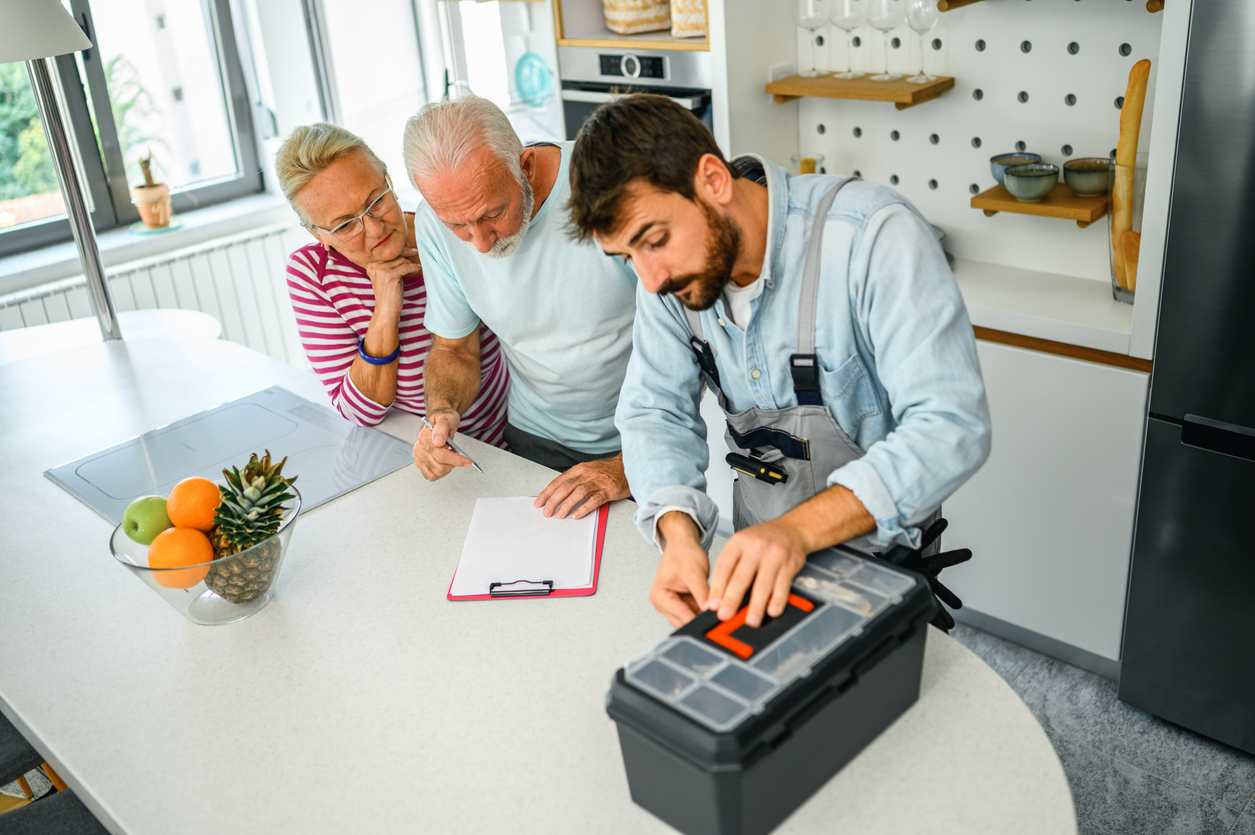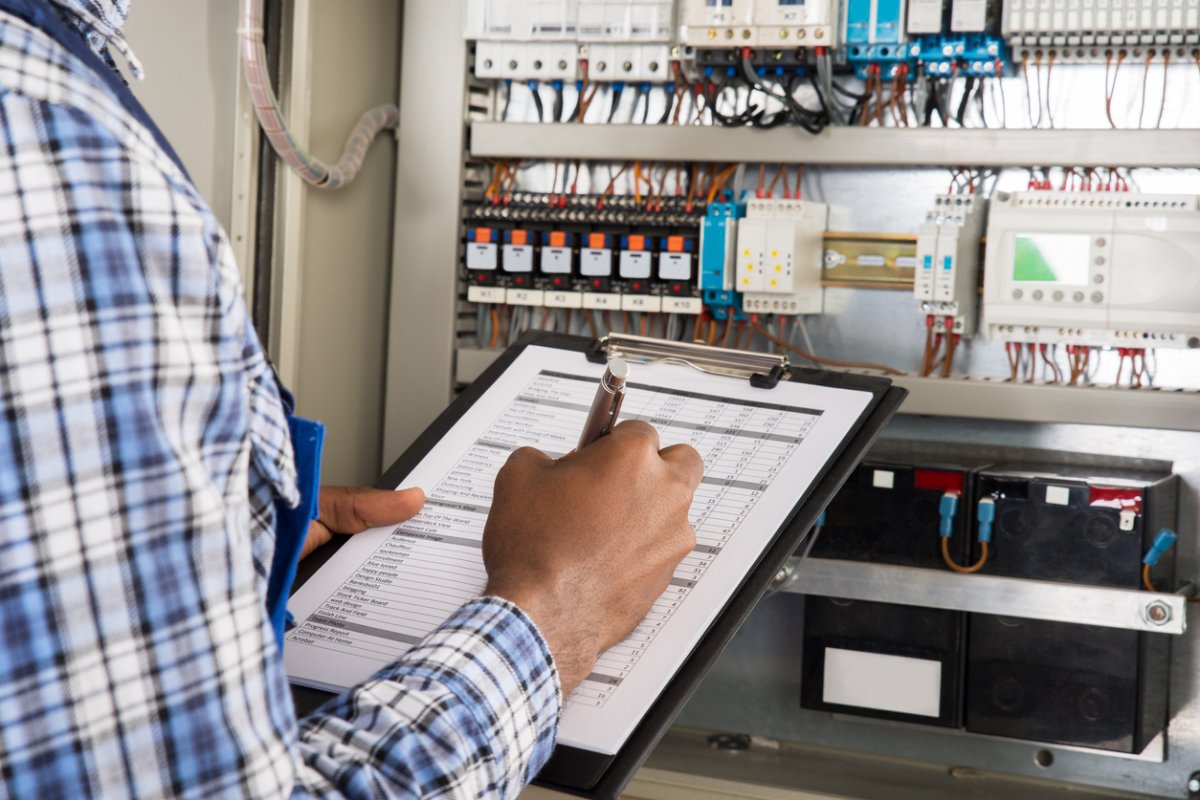We may earn revenue from the products available on this page and participate in affiliate programs. Learn More ›
Highlights
- An electrical inspection costs $155 on average, though a typical range is $100 to $400.
- The total inspection cost is determined by the type of inspection, home size, wiring condition and accessibility, current labor rates, needed repairs, and other factors.
- Faulty electrical wiring poses a safety risk to the home’s occupants, which is why homeowners are advised to call an electrician if they see unexplained discoloration on walls, feel hot spots, or smell burning odors.
- Qualified electricians have technical knowledge about current codes and safety standards for electrical wiring, which is why an electrical inspection should be performed only by a licensed professional.
When it comes to ensuring the safety of a home’s electrical system, an electrical inspection is a necessary investment for remodels or new home purchases. According to Angi and HomeAdvisor, an electrical inspection cost ranges from $100 to $400, with the national average around $155. It’s important to note that the cost of a safety inspection can vary depending on the size of the house, the complexity of the electrical system, and the location. Any necessary repairs or upgrades that are identified during the electrical system inspection can also increase the overall cost.
Homeowners are advised to make sure the electrician is licensed, insured, and qualified. Home inspector pricing for electrical wiring can vary among providers, but it’s essential to prioritize expertise and quality over price, since a thorough electrical inspection can potentially save homeowners from dangerous situations and expensive repairs in the future. After the inspection, most electricians will provide homeowners with an electrical inspection certificate or report, which provides documentation of the system’s condition and any recommended repairs or upgrades.

Factors in Calculating Electrical Inspection Cost
Although the national average cost for an electrical inspection is $155, the local average can be significantly higher or lower. The wide range of pricing is due to variations in home size, inspection type, wiring condition and accessibility, local labor costs, and any needed electrical repairs.
Home Size
Typically, the larger the home, the more extensive the electrical system. Larger homes have more outlets, light fixtures, and electrical panels. When there are more electrical components, an inspector will need to spend more time assessing and evaluating the electrical system. Multistory homes may have additional circuit breakers and wiring to accommodate the increased electrical load. These additional components add to the time and effort required for the inspection, resulting in higher house inspection fees.
Inspection Type
The type of inspection can significantly affect the cost of an electrical inspection, since each inspection type serves a specific purpose. Some types of electrical home inspections include general code compliance, a full home electrical inspection, infrared inspection, and standard inspection. Homeowners are encouraged to know that there are differences between an appraisal vs. home inspection and that they may need to schedule both to ensure they understand the condition of a home they are buying or selling. If this type of work is interesting to a homeowner, they might consider enrolling in one of the best home inspector training programs.
Wiring Condition and Accessibility
The condition of the house electrical wiring and the accessibility of the electrical components are two important factors that contribute to the overall cost of an electrical inspection. The wiring condition plays a fundamental role in costs since inspecting outdated or deteriorated wiring requires more time and expertise. If the house wiring is in poor condition or poses safety risks, the inspector may need additional time and resources to assess, document, and recommend repairs or rewiring. For example, the cost to replace knob and tube wiring is significantly higher than average since it’s an outdated system.
If the wiring is easily accessible and visible, the inspector can quickly evaluate its condition and make the necessary recommendations. But if the wiring is hidden behind walls, beneath flooring, or in other hard-to-reach areas, the inspector may need to use specialized tools or perform more invasive procedures, such as drilling holes or removing panels, to assess the wiring properly. The additional steps can increase the time and effort required for the inspection, resulting in a higher cost.
Labor
The labor involved in an electrical inspection can significantly affect the overall cost. While many electricians charge a flat rate for inspections, others may charge by the hour. It’s important for homeowners to know how their electrician charges so they can compare the price differences between the flat rates and the by-the-hour rates. Those with large or older homes may want to consider how the age of the wiring, size of the house, and wiring accessibility can add to the overall time it takes for an electrician to inspect and evaluate every aspect of the electrical system. How much does an electrician cost? On average, journeymen electricians start their rates at $50 per hour, while more experienced master electricians start at around $100 per hour.
Electrical Repairs
The type and extent of work required for electrical repairs play a significant role in electrical inspection costs. The cost of doing simple repairs, such as replacing a faulty outlet or fixing a defective light fixture, is less than the cost of rewiring a house or upgrading an outdated electrical panel. These latter repairs cost more than the average home inspection cost. Knowing how much electrical repairs cost can help homeowners budget for an electrical inspection.
| Electrical Repair | Average Cost (Materials and Labor) |
| 220-volt or 240-volt outlet installation | $250 to $800 |
| Basic electrical wiring | $6 to $8 per square foot |
| Ceiling fan installation | $75 to $150 |
| Circuit breaker switch replacement | $100 to $260 |
| Dedicated circuit installation | $250 to $900 |
| Electric panel replacement | $850 to $2,500 |
| Electrical permit | $50 to $350 |
| Exhaust fan installation | $250 to $950 |
| Full house rewiring | $1,500 to $8,000 |
| GFCI outlet installation | $150 to $350 |
| Indoor outlet installation or replacement | $210 |
| Junction box installation | $100 to $300 |
| Knob and tube wiring replacement | $1,500 to $8,000 |
| Light fixture installation | $100 to $650 |
| Light fixture repair | $200 |
| Light switch installation | $100 to $300 |
| Light switch replacement | $50 to $250 |
| Outdoor electrical outlet installation | $180 to $350 |
| Outdoor electrical outlet replacement | $100 to $175 |
| Outlet cover replacement | $10 to $30 |
| Outlet grounding | $100 to $300 |
| Smoke and carbon monoxide detector installation | $90 to $150 |
| Subpanel installation | $500 to $1,700 |
Types of Electrical Inspections
Homeowners might need one or more kinds of electrical inspection, depending on the existing wiring condition and accessibility. The type of inspection can depend on the size and age of the house, as well as any specific concerns or requirements of the homeowner.
| Type of Electrical Inspection | Average Cost |
| Code compliance | Free or included in repair cost |
| Full home electrical inspection | $250 to $400 |
| Infrared | $150 to $350 |
| Standard | $100 to $200 |
Code Compliance
An electrical inspection for code compliance is often free of charge or included in the repair cost. When an electrician comes to a home to make a repair, they will typically inspect the electrical system to make sure the wiring is up-to-date to pass the minimum code requirements for safety and efficiency. Hiring one of the best home repair services is an excellent way to identify and prevent serious electrical issues.
Full Home Electrical Inspection
A full home electrical inspection can cost from $250 to $400. This type of comprehensive inspection includes the examination of any system or area that has electrical components, including connections to the HVAC system, appliances, lights, etc. Sometimes a more comprehensive electrical inspection is included in a full home inspection where even the foundation and roof are checked. Choosing one of the best home inspection services can help homeowners better understand the overall condition of the home.
Infrared
An infrared electrical inspection looks for hot spots behind walls. The inspector can find loose connections, defective electrical components, and overheating electrical circuits using high-tech infrared thermal imaging. This type of electrical inspection ranges in price from $150 to $350.
Standard
For a complete check of a home’s electrical system, an inspector will perform a standard electrical safety inspection. The inspector will refer to an electrical inspection checklist during the process and provide an electrical inspection report that proves the system is working properly and up to code. This process verifies that a home is generally protected against fire, electric shocks, and power surges caused by faulty wiring. A standard safety inspection may be required when a homeowner acquires insurance, refinances their home, applies for a mortgage, or sells their home. A standard electrical inspection cost averages $100 to $200.

Do I need an electrical inspection?
An electrical inspection can catch a potential or existing problem with the wiring that can lead to significant home damage or endanger the home’s occupants. Homeowners may notice several red flags that the electrical system is not working properly: hot spots on walls, ceilings, or outlets; discoloration on walls; a burning smell; smoke from wiring connections; or increased energy bills. Any of these signs warrant a call to an electrician as soon as possible so they can inspect the electrical system and recommend repairs.
Hot Spots on Walls or Ceilings
Hot spots on walls or ceilings can be urgent signs that an electrical inspection is needed. Hot spots often suggest electrical issues within the walls, such as faulty wiring or overloaded circuits. These can pose serious fire hazards and compromise the safety of the entire electrical system and the home’s residents. If there are areas on the walls and ceilings that feel unusually warm to the touch, it’s recommended that homeowners call a professional, who can identify the underlying issues and recommend repairs.
Discoloration on Walls
Discoloration on walls stemming from electrical issues can show as yellow or brown spots, black streaks, or even charring. A possible cause of this type of discoloration is wires that are overheating behind the walls. Electrical wires naturally generate heat, but excessive heat that isn’t properly channeled can degrade the insulation in the walls, leading to discoloration as a warning sign. The heat build-up can be caused by faulty connections, overloaded circuits, damaged wiring, or even loose outlets. If left untreated, it can lead to electrical shorts, fires, or shocks.
Burning Smell
A burning smell is a clear indication that an electrical inspection and repair are urgently needed. A burning odor coming from electrical outlets, appliances, or an electrical panel is a sign of overheating, electrical arcing, or other issues within the electrical system. These issues pose a serious fire hazard, and homeowners are advised to call a professional immediately.
Increased Energy Bills
An unexplained increase in electric bills can be a sign that a home needs an electrical inspection. While many factors can influence higher energy consumption, unexplained spikes in costs may indicate serious issues with a home’s electrical system. Some problems can include outdated wiring, inefficient appliances, or electrical components drawing excessive power.

Electrical Inspection: DIY vs. Hiring a Professional
When dealing with a home’s electrical system, homeowners are wise to err on the side of caution. Some homeowners who have a background in electrical repair may be able to resolve minor electrical issues or even update a light switch. But electrical inspections are another story entirely. Qualified journeymen and master electricians are trained and qualified to understand current code and safety protocols that most homeowners are not familiar with.
Attempting DIY electrical inspections and repairs can not only endanger a homeowner while they’re making the repairs, but it can also increase the risk of electrical fires and other hazards in the future. While it’s advisable to monitor any issues with a home’s electrical system and promptly address any problems, generally only skilled professionals have the expertise to identify and diagnose electrical issues accurately. For an electrical inspection quote, homeowners will want to reach out to a professional electrician near them.
How to Save Money on Electrical Inspection Cost
Electrical inspections are an important part of maintaining the safety of a home, but the costs of any home inspection can quickly add up. By following a few helpful tips, homeowners can save on electrical inspection costs without compromising on safety.
- Get multiple estimates. Before hiring an electrician for an inspection, homeowners will want to take time to research and compare prices from reputable electricians in their area to find a price that works with their budget.
- Bundle services. If multiple electrical inspections or repairs are needed, homeowners can consider bundling them together to save on overall costs. Many electricians offer discounts for customers who schedule multiple services at the same time.
- DIY preliminary checks. Before calling an electrician, a homeowner can conduct some preliminary checks to identify any obvious issues and point the electrician in the right direction.
- Ask for referrals. Homeowners can reach out to friends, family, or neighbors who have recently had electrical inspections. They may be able to recommend a trustworthy and affordable electrician who may offer a referral discount.
- Schedule during off-peak times. Homeowners will want to consider scheduling their electrical inspection during off-peak seasons. Electricians who have more availability may offer discounted rates.

Questions to Ask About Electrical Inspections
Asking an electrician the right questions about an electrical inspection can help homeowners save money, avoid miscommunication, and gain a better understanding of the electrical inspection process.
- What are your qualifications and certifications?
- How many years have you been conducting electrical inspections?
- Are you licensed, bonded, and insured?
- Will you provide a list of references?
- Are you up to date on the most recent code changes?
- What specific areas will be evaluated during the inspection?
- Will you provide a detailed report of your findings?
- Are there any immediate safety concerns or necessary repairs?
- How long will the inspection take?
- Are there any potential additional costs?
- What can I do to prepare my home for an electrical inspection?
- What preventative measures can I take to maintain my electrical system?
- Can you give me any tips for improving energy efficiency in my home?
- Do you offer a warranty or guarantee on your inspection services?
- What is your payment policy?
- How can I leave a review of your work?
FAQs
One of the most common concerns among homeowners who are planning to have an electrical inspection is the cost. To feel more confident about the process and to understand the electrical inspection process better, they can read answers to some frequently asked questions.
Q. What will fail an electrical inspection?
Several issues won’t pass an electrical inspection. They can range from simple issues to more complex problems that will require significant repairs, including the following:
- ungrounded outlets
- double-tapped circuit breakers
- exposed light bulbs in closets
- wrong outdoor outlet covers
- excessive extension cord use
- lack of tamper-resistant outlets
- unfilled openings in electrical panels
- malfunctioning GFCIs
Q. How long does an electrical inspection take?
Many homeowners wonder how long an electrical inspection takes. The answer is between one and two hours. However, a full home inspection or infrared inspection takes longer.
Q. Do electrical inspectors need insurance?
Electrical inspectors need to have general insurance and E&O (errors and omissions) insurance to cover issues that arise if the inspector makes an error or mistake that can cause damage to a home.
Sources: Angi, HomeAdvisor, HomeGuide


